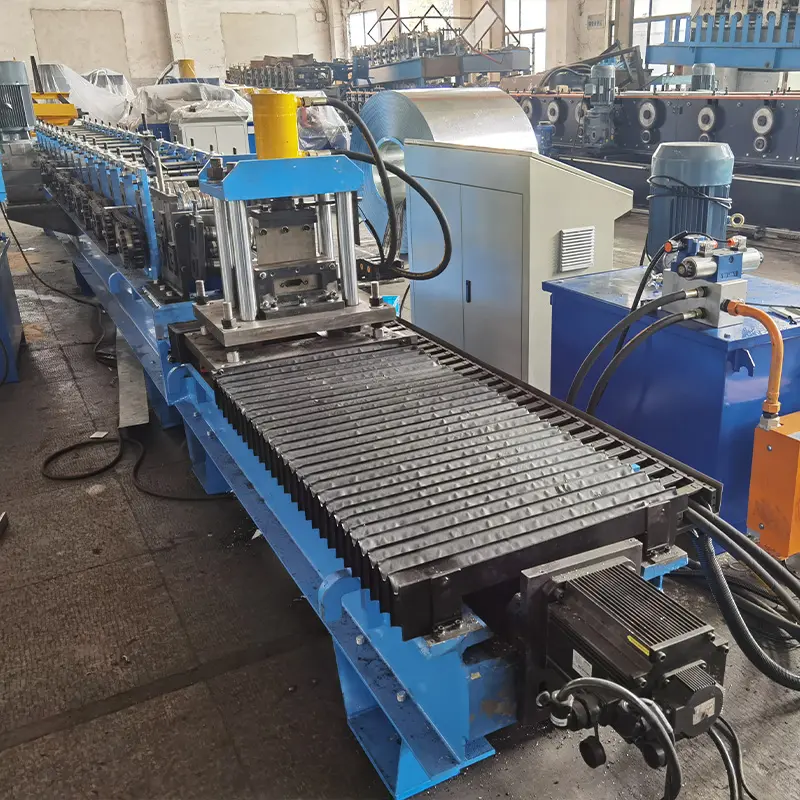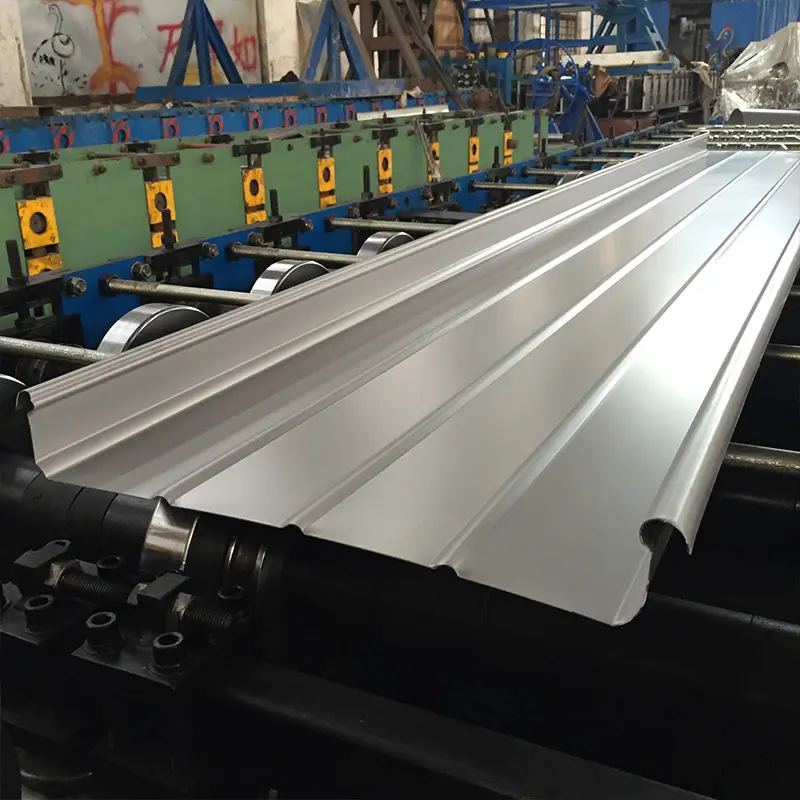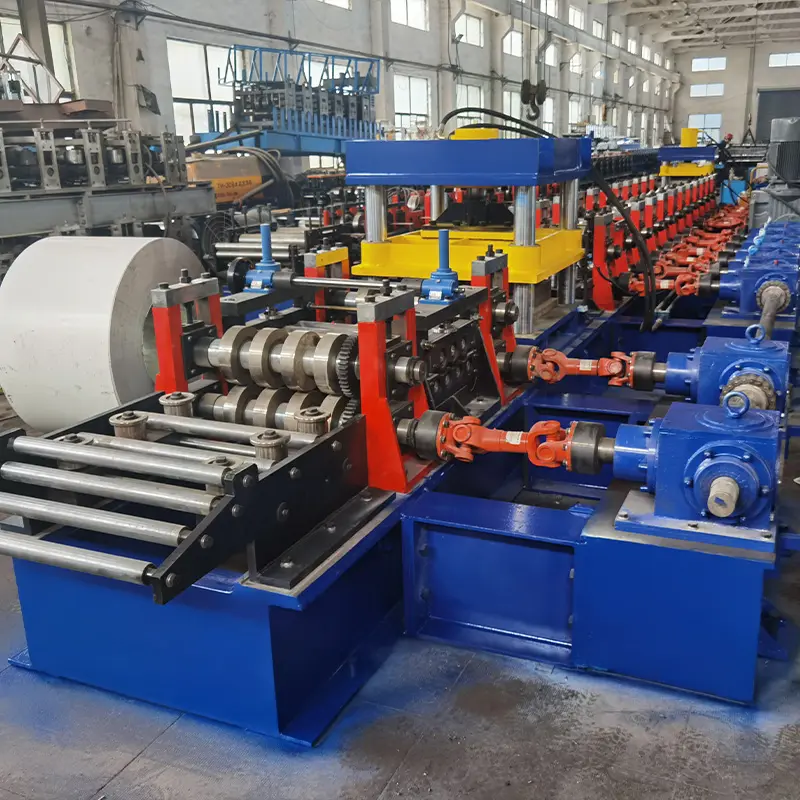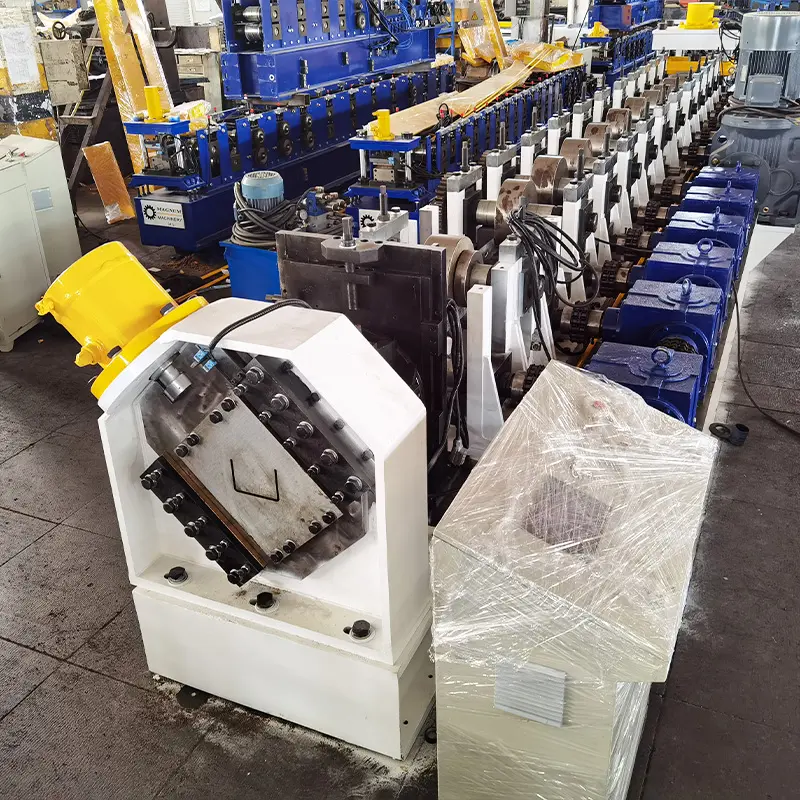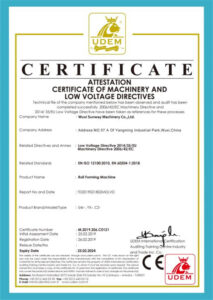ভূমিকা
The construction industry has witnessed remarkable technological advancements over the years, and one such innovation that has transformed the roofing sector is the Roofing Roll Forming Machine. In this article, we will explore the various aspects of this machine, its components, working principle, advantages, applications, and future trends. Let’s delve into the world of roll forming machines and how they have revolutionized the roofing industry.
Understanding Roll Forming
Definition of Roll Forming: Roll forming is a continuous metal shaping process used to create uniform profiles by passing a flat strip of metal through consecutive sets of rollers.
Roll Forming Process Explained: The roofing roll forming machine operates on the principle of roll forming. The metal strip is fed into the machine, where it undergoes a series of bending operations using rollers to obtain the desired shape.
Advantages of Roll Forming in Roofing: Roll forming offers numerous advantages over traditional sheet metal fabrication, such as enhanced strength, uniformity, and the ability to create complex profiles.
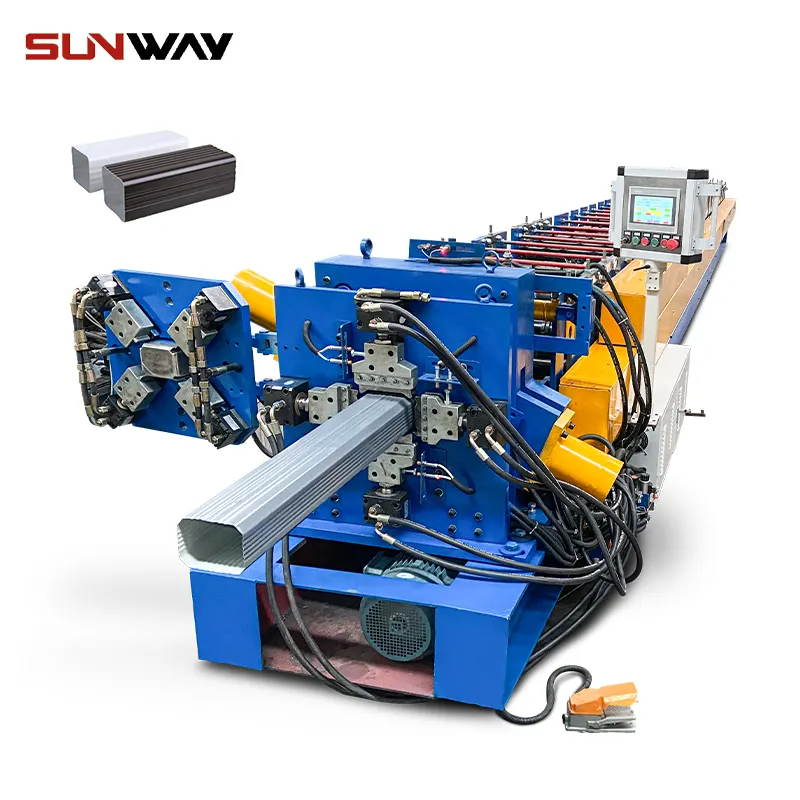
Components of a Roofing Roll Forming Machine
A roofing roll forming machine consists of several essential components that work together to produce high-quality roofing panels. These components include:
Entry Section: The entry section is where the metal strip is fed into the machine for further processing.
Roll Tooling: Roll tooling plays a crucial role in shaping the metal strip into the desired roofing profile. Different roll tooling sets can be used to create various roof panel designs.
Cutoff Press: The cutoff press is responsible for cutting the continuous roofing panel into specific lengths as required.
Electrical Control System: The electrical control system ensures the proper functioning of the machine and allows for easy adjustments to the forming process.
Material Handling System: The material handling system handles the movement of the metal strip within the machine, ensuring smooth operation.
ছাদ রোল গঠন মেশিনের প্রকার
There are several types of roofing roll forming machines available, catering to different roofing applications:
Single Roof Panel Roll Forming Machine: This type of machine is designed to produce a single type of roofing panel.
Double Layer Roofing Roll Forming Machine: Double layer roll forming machines have two sets of roll tooling, enabling the production of two different roofing profiles simultaneously.
ঢেউতোলা ছাদ প্যানেল রোল তৈরির মেশিন: Corrugated roll forming machines are specifically used to create corrugated roofing panels, known for their strength and durability.
Working Principle of Roofing Roll Forming Machine
The working principle of a roofing roll forming machine is a step-by-step process that involves several stages:
- Material Loading: The metal strip is loaded into the entry section of the machine.
- Forming: The metal strip passes through a series of rollers equipped with the required roll tooling, which bends the metal into the desired profile.
- Cutting: The continuous roofing panel is cut into specific lengths using the cutoff press.
- Stacking: The finished roofing panels are stacked and prepared for further processing or transportation.

Advantages of Using Roofing Roll Forming Machines
Roofing roll forming machines offer several advantages that make them highly sought after in the roofing industry:
High Efficiency and Productivity: Roll forming machines can produce roofing panels at high speeds, ensuring faster project completion.
Cost-effectiveness and Material Savings: Roll forming optimizes material usage, reducing waste and ultimately lowering the overall cost of roofing projects.
Consistent and Precise Roof Panel Production: The automated nature of roll forming ensures consistent and accurate roofing panel production, maintaining high-quality standards.
Customization Options for Roofing Profiles: Roll forming machines can be adjusted to create a wide variety of roofing profiles, providing flexibility to meet diverse customer requirements.
Factors to Consider When Choosing a Roofing Roll Forming Machine
Selecting the right roofing roll forming machine for your business requires careful consideration of several factors:
Production Speed and Capacity: The production speed and capacity of the machine should align with your project requirements.
Material Compatibility: Ensure that the machine can work with the specific metal materials you intend to use for roofing panels.
Machine Durability and Maintenance: Invest in a durable machine that requires minimal maintenance to maximize its lifespan.
Automation and Control Features: Look for machines with advanced automation and control features for ease of operation and efficiency.
Safety Precautions and Maintenance Tips
Maintaining safety standards and regular machine maintenance are vital to ensuring smooth and accident-free operation:
Safety Measures for Machine Operators: Provide appropriate training and safety gear to machine operators to avoid accidents.
Regular Maintenance to Ensure Smooth Operation: Schedule routine maintenance checks to identify and address any potential issues before they escalate.
Applications of Roofing Roll Forming Machines
Roofing roll forming machines find extensive applications in various roofing projects:
Residential Roofing: The ability to create a wide range of roofing profiles makes roll forming machines ideal for residential roofing applications.
Commercial Roofing: Roll forming machines are commonly used in commercial roofing projects due to their efficiency and versatility.
Industrial Roofing: For large-scale industrial roofing projects, roll forming machines offer unmatched productivity and precision.
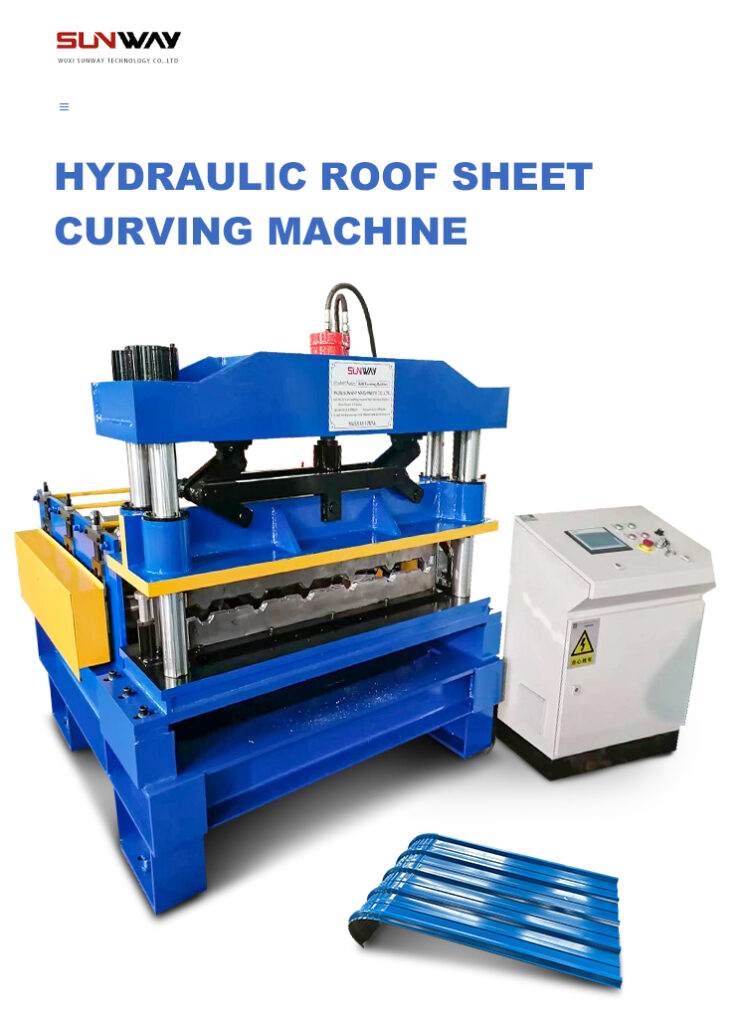
How Roofing Roll Forming Machines Improve Construction Efficiency
Streamlined Roofing Installation Process: Traditional roofing methods often require time-consuming manual labor, resulting in slower installation times. With roofing roll forming machines, the entire process is automated, reducing the need for manual intervention and speeding up the installation process. This not only saves time but also reduces labor costs, making roofing projects more cost-effective.
Minimizing Labor Intensive Tasks: Roofing roll forming machines handle the majority of the roofing panel production, reducing the need for manual labor in shaping and cutting the panels. This enables construction crews to focus on other essential tasks, such as roof assembly and installation. As a result, projects can be completed faster, and deadlines can be met more efficiently.
Future Trends and Innovations in Roofing Roll Forming
The roofing industry is continually evolving, and roofing roll forming machines are no exception. Several trends and innovations are shaping the future of roll forming technology:
Advancements in Automation and Robotics: The future of roofing roll forming machines lies in advanced automation and robotics. Smart machines equipped with AI and machine learning capabilities will further enhance the efficiency and precision of roofing panel production.
Eco-friendly Roofing Materials and Processes: With the growing focus on sustainable construction, the roofing industry is witnessing a shift towards eco-friendly materials and processes. In the future, roofing roll forming machines are expected to be compatible with various eco-friendly materials, such as recycled metals and sustainable coatings.
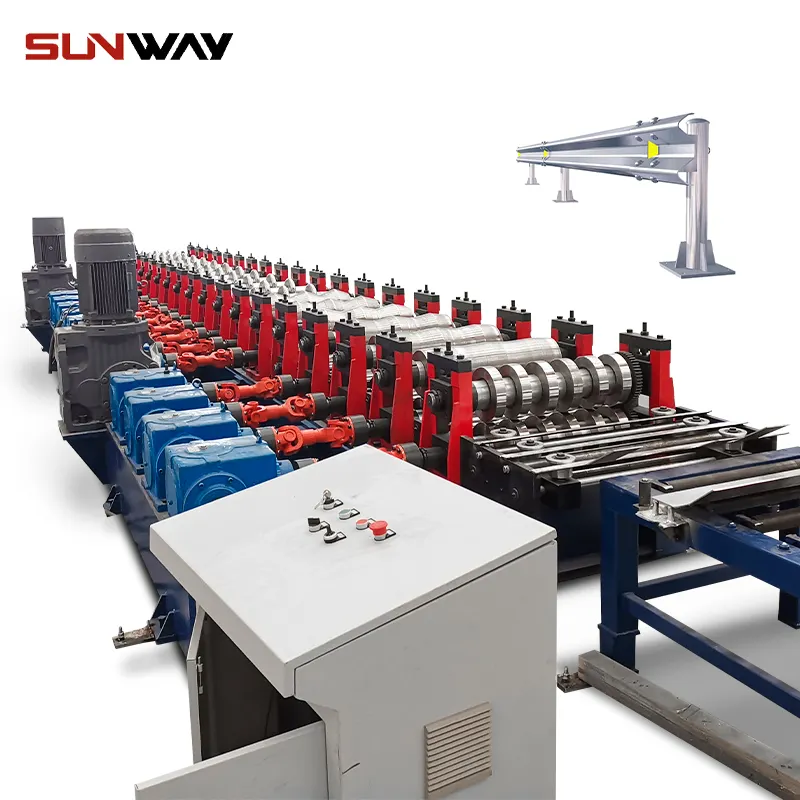
উপসংহার
Roofing roll forming machines have revolutionized the roofing industry, offering numerous advantages over traditional roofing methods. From high efficiency and productivity to cost-effectiveness and precise panel production, these machines have become a game-changer in the construction sector. As technology continues to advance, we can expect even more innovative and eco-friendly solutions in the roofing roll forming industry, further improving construction efficiency and sustainability.
FAQs (Frequently Asked Questions)
1. How does a roofing roll forming machine work?
A roofing roll forming machine works by feeding a metal strip into the machine, where it undergoes a series of bending operations using rollers equipped with specific roll tooling. The machine then cuts the continuous roofing panel into desired lengths, producing uniform and precise roofing profiles.
2. What are the benefits of using a roofing roll forming machine?
Roofing roll forming machines offer several benefits, including high efficiency and productivity, cost-effectiveness, consistent and precise panel production, and customization options for roofing profiles.
3. Can roofing roll forming machines handle different types of roofing materials?
Yes, roofing roll forming machines are versatile and can work with various metal materials commonly used in roofing, such as steel, aluminum, and copper.
4. How can roofing roll forming machines improve construction efficiency?
Roofing roll forming machines improve construction efficiency by streamlining the roofing installation process and minimizing labor-intensive tasks. The automated nature of these machines reduces the need for manual labor and speeds up the overall roofing project completion.
5. What are the future trends in roofing roll forming?
The future of roofing roll forming lies in advanced automation and robotics, as well as a shift towards eco-friendly roofing materials and processes. Smart machines with AI capabilities and compatibility with sustainable materials are expected to shape the industry’s future.

